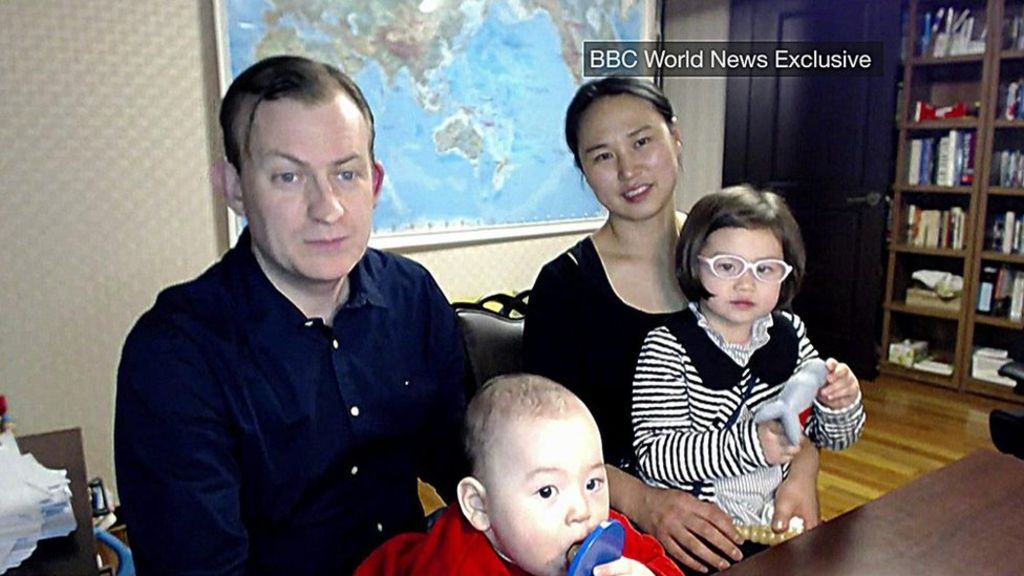By now you’ve undoubtedly seen the children-invade-home-office/bedroom-during-live-BBC-interview viral video. But in case you missed it, here’s what happened:
Robert Kelly, a political science professor at a South Korean university, was giving a Skype interview to BBC World about South Korean president Park Geun-hye’s impeachment. Kelly looks quite professional in a dark suit and tie. All the trappings of a poli-sci professor’s office surround him: a map mounted to the wall and shelves full of books behind him, more books splayed across what appears to be a table. All is going according to plan as he authoritatively chats with the interviewer. And then all hell breaks loose.
First, a toddler comes in through the door behind Kelly and dances herself over to Dad’s desk. The interviewer announces that a child has just walked into the room as Dad, seeming simultaneously embarrassed, annoyed, and amused, pushes his dancing daughter aside. Next, as if on cue, a baby in a walker wheels into the room, unbeknownst to Dad, as he apologizes for the toddler’s interruption. Then Mom bursts in, and hurriedly grabs the kids and drags them out of the room, knocking over the books on the “table,” which turns out to be a cleverly disguised bed. (A closer look reveals Kelly wasn’t in his university office but in a home office tucked into a bedroom.) There’s more apologizing. Then the interview resumes with the sound of kids crying outside the door.
Although most people on social media found the clip funny and were generally sympathetic to Kelly for enduring the “embarrassment,” it left me thinking about how far we still have to go in being fully comfortable with the popular concepts of flexible work arrangements and work–life balance — and with their occasionally messy complications.
Many people in the workforce have children. And many — by necessity, design, or convenience — work from home. With that, on occasion, a free-range toddler or baby may appear, perhaps sneaking away from a nanny, parent, or other caregiver. Working remotely, we are told, can be a spur to productivity. People who work at home avoid commutes and, often, enjoy greater satisfaction overall. When you integrate family life with work, it means you don’t have to check out of the office for the entire day if a 4-year-old needs to be taken to her checkup.
At the same time, however, our conventions of the office follow us to the home. We’re supposed to be professional at all times, focus intently on the task at hand, and dress appropriately for the occasional Skype interview. But as anyone who has ever worked at home knows, home life occasionally intrudes. It just doesn’t happen frequently on camera.
Of course, it’s difficult to adjust instantly to the appearance of two spunky kids in a television interview. It’s difficult to tell the anchor you want to go on hold for a few seconds while you deal with something. So it’s hard to blame Kelly for trying to act as if there were no distraction. But let’s imagine a thought experiment. What would have happened if Kelly had paused to acknowledge the disruption? Let’s say that instead of pushing his daughter away, Kelly had pulled her up onto his lap and introduced her briefly. He could have apologized to the audience with some self-deprecation that he was working at home that day and that these were his research assistants. Adorable and smooth!
One possible reaction might have been sympathetic nods all around. As more people work at home, and as work follows us to our homes through mobile phones and laptops, more people have personal experience with just these sorts of interruptions. This one just happened to take place on a serious-minded media outlet.
Rather than maintain the fiction that the home office is some sort of hermetically sealed sanctum — a replica of the actual office — addressing the little elephants in the room would have sent a strong message: Here is an involved and caring father who, like so many other parents, sometimes works from home. The fact that toddlers occasionally stray into the office during work hours doesn’t make Kelly any less of an expert on South Korea or detract from the quality of analysis he offered. Kelly was booked on the show for his expertise, not for his ability to come to a studio.
But one could also imagine an alternative reaction to such a move. It’s possible that our workplaces are not quite as evolved as we think they are — especially when the workplace in question is a visual medium in which protocols are taken quite seriously. Before people go on the air to conduct interviews, producers run them through a series of questions designed to limit interruptions: Have you turned off your phone? Have you closed the door to the studio? Have you taken steps to ensure this will come off smoothly? In this instance, the professor didn’t fully live up to his end of the bargain. And one could easily imagine the consequences if a guest were to make a bigger deal out of the disruption.
It’s one of the wonders of the modern world that a parent working at home can conduct a professional interview with a global broadcast network from a bedroom — and still be available to acknowledge the presence of his children. I’d like to think we’re moving in a direction in which such disruptions — challenging as they sometimes are — can be embraced rather than shooed away.
Credit: Strategy& || A Consulting business of PwC


